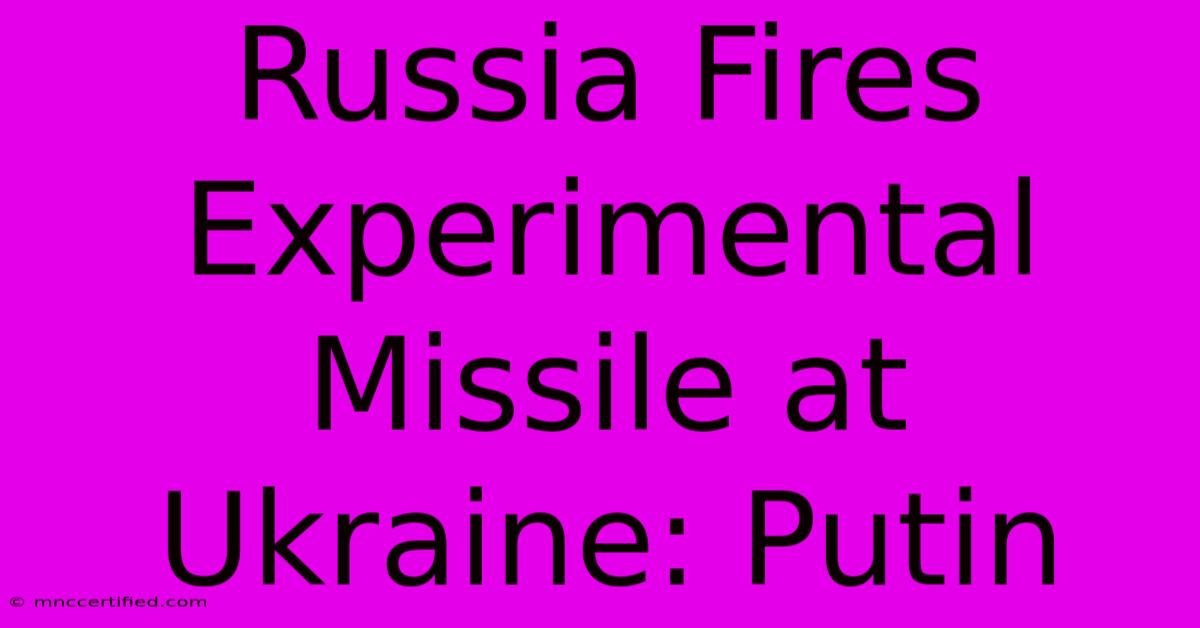Russia Fires Experimental Missile At Ukraine: Putin

Table of Contents
Russia Fires Experimental Missile at Ukraine: Putin's Escalation and Global Implications
Russia's ongoing conflict with Ukraine took a dramatic turn with the reported use of an experimental hypersonic missile. This action, attributed to President Vladimir Putin's regime, has sent shockwaves across the globe, raising concerns about the escalation of the war and the potential for wider international conflict. This article delves into the incident, analyzing its implications and exploring the potential ramifications for global security.
The Reported Missile Strike: Details and Uncertainty
Reports indicate that Russia deployed an experimental hypersonic missile against Ukrainian targets. While the exact type of missile remains unconfirmed by independent sources, initial reports suggest it could be a variant of the Kinzhal (Dagger) or a completely new weapon system. The lack of immediate, verifiable photographic or video evidence necessitates caution in accepting all claims at face value. Verification of weapon type and impact assessment requires independent investigation and corroboration from multiple reliable sources, something hampered by the ongoing conflict. This information vacuum underscores the need for careful analysis and avoiding the spread of misinformation.
Hypersonic Weapons: A Game Changer?
The potential use of a hypersonic missile signifies a significant escalation. Hypersonic weapons, capable of exceeding five times the speed of sound, present unique challenges for existing missile defense systems. Their speed and maneuverability make them difficult to intercept, potentially altering the dynamics of warfare. This deployment highlights Russia's ongoing efforts to modernize its military arsenal and maintain a technological advantage. The strategic implications of deploying such advanced weaponry are far-reaching and require careful consideration.
Putin's Motives and the Geopolitical Landscape
Putin's decision to potentially employ this experimental missile raises several crucial questions about his strategic objectives. Is this a demonstration of military strength aimed at intimidating Ukraine and its Western allies? Or is it a tactical move designed to achieve specific military objectives on the battlefield? Analysts suggest several possible motivations, including:
- Intimidation and Deterrence: A clear message to Ukraine and the West to dissuade further support for Kyiv.
- Testing and Evaluation: A real-world test of the missile's capabilities in a combat environment.
- Shifting Military Strategy: A signal of a potential change in Russia's approach to the war, possibly indicating a more aggressive phase.
The incident has further complicated the already tense geopolitical landscape. Western powers are likely to react strongly to this perceived escalation, potentially leading to further sanctions against Russia and increased military aid to Ukraine. The risk of direct military confrontation between NATO and Russia remains a major concern.
International Response and Future Implications
The international community's response will be critical in shaping the future trajectory of the conflict. Strong condemnation and coordinated action by Western allies are essential to deter further aggression. However, the need to avoid actions that could escalate the conflict into a wider war is paramount. Diplomatic efforts to de-escalate the situation and find a peaceful resolution must remain a priority.
The use of experimental weaponry also raises ethical questions. The lack of comprehensive testing and potential for unforeseen consequences raise concerns about the responsible use of advanced military technologies.
Conclusion: Uncertainty and the Need for Vigilance
The reported use of an experimental hypersonic missile by Russia in Ukraine marks a significant development in the ongoing conflict. The incident underscores the need for vigilance, careful analysis, and a measured response from the international community. The situation remains fluid, and further developments are likely to unfold in the coming days and weeks. Continued monitoring of the situation, coupled with robust fact-checking and reliance on credible sources, is vital for understanding the full implications of this potentially game-changing event. The potential for further escalation necessitates a cautious approach and a commitment to de-escalation and peaceful resolution.

Thank you for visiting our website wich cover about Russia Fires Experimental Missile At Ukraine: Putin. We hope the information provided has been useful to you. Feel free to contact us if you have any questions or need further assistance. See you next time and dont miss to bookmark.
Featured Posts
-
Mexico Citizenship By Investment
Nov 22, 2024
-
Investment Management Phoenix Az
Nov 22, 2024
-
Jelly Roll At Houston Juvenile
Nov 22, 2024
-
Briefings Restart Same Problems Remain
Nov 22, 2024
-
Plymouth Capital Investment Fund
Nov 22, 2024